- Home
- Jude Hardin
Redline: The Reacher Experiment Book 6 (The Jack Reacher Experiment) Page 2
Redline: The Reacher Experiment Book 6 (The Jack Reacher Experiment) Read online
Page 2
And the ice just kept getting thinner.
“Just remember that shit rolls downhill,” Colonel Dorland said. “Get off my porch. I want a written report on my desk by zero seven hundred tomorrow morning. Think you can handle that?”
“Yes, sir.”
Talfin saluted, and then he walked back through the cabin and exited through the front door.
Dorland pulled his cell phone out of his pocket and pressed the SEND button on a text message he’d composed earlier. He heard Lieutenant Talfin start his car, and he heard the sound of rubber on gravel as he backed out of the driveway. And that was all he heard. He didn’t hear Talfin skidding to a stop when he got to the roadblock a mile or so down the mountain, and he didn’t hear Talfin shout and scream as he was being dragged out of his vehicle and forced to walk into the woods. He didn’t hear any of that, and he certainly didn’t hear the gunshot that drove a bullet into Talfin’s brain, because the staff sergeant he’d sent the message to always used a sound suppressor on these types of occasions.
4
The alleged facility where the alleged experiments were taking place wasn’t actually located within the Myrtle Beach city limits. It was on a small island, a couple of miles off the coast. Only accessible by boat or helicopter.
Wahlman steered away from the ticket booth and joined a line of cars and trucks waiting to board the ferry. The flow of traffic was being regulated by a signal at the edge of the boarding ramp. It changed from red to green when the crew was ready for another car to make its way up onto the parking deck. The boat had probably been around for a century or so, but it appeared to be in pretty good shape. In fact, there were parts of it that appeared to be brand new. The original diesel inboards had been replaced with solar-tidal hybrids from a company called Motion-Prop, and the decks had been coated with a gritty heat-absorbing compound that had only been around for a few years. Wahlman was impressed. Too many vessels from that era were sold for scrap or intentionally sunk and left to rust away at the bottom of the ocean. It was nice to see one that had been properly refurbished.
Wahlman lifted his foot from the brake, allowing his car to inch forward as one of the vehicles ahead of him boarded the ferry. He looked over at Rusty, who was screwing the cap back onto a half-pint bottle that was a little less than half full.
“I’m curious as to why the Army didn’t provide transportation for you,” Wahlman said.
“They sent me some money,” Rusty said. “I used it for other things. Necessities.”
“Food and shelter are necessities. Whiskey and cigarettes are not.”
Rusty shrugged. “Are you going to lecture me now?” he said.
“No,” Wahlman said. “But weren’t you concerned that you wouldn’t be able to get here in time?”
“I’m not scheduled to report until tomorrow morning. So I’m actually going to be early.”
“That’s not what I meant,” Wahlman said.
Rusty seemed puzzled for a few seconds. Then it sunk in.
“Oh,” he said. “You meant that I could have died while I was out there on the road, trying to hitch a ride. To tell you the truth, the thought never really crossed my mind.”
Wahlman inched forward some more. He was next up to board the ferry. The light turned green and he eased the sedan up the ramp and onto the parking deck. One of the crew members directed him toward the last available slot, a cramped sliver of space between a black pickup truck and a gray SUV.
“What do you think?” Wahlman said.
“Looks pretty tight,” Rusty said. “We might have to wait for the next ferry.”
Wahlman didn’t feel like waiting. He had to back up and pull forward a couple of times, but he finally managed to squeeze into the spot. He switched off the engine, glanced into the rearview mirror and saw another one of the crew members dragging a heavy steel chain across the boarding lane. The crew member secured the chain, and then he distributed three orange traffic cones along the length of it. A few minutes later, the ferry pulled away from the ramp and started moving out into the bay.
“I’m going to get out and walk around for a while,” Wahlman said.
“Mind if I join you?”
“It’s a free country.”
“That’s right. And some of us fought to keep it that way.”
Wahlman thought about telling Rusty that he too was a veteran, that he too had engaged in multiple fierce battles in multiple faraway places, that he’d taken the oath and had served honorably and had experienced more horrific action in twenty years than anyone should experience in twenty lifetimes. He thought about telling Rusty those things, but he didn’t. He reminded himself that he was on the run, living under an alias. The more you say about yourself in a situation like that, the more likely you are to be caught in a lie. So you say as little as possible. You talk to as few people as possible. And when you do talk to someone, you say things that can’t easily be verified.
Wahlman climbed out of the car. There was a walkway along the starboard side of the ferry, a platform about as wide as a diving board, and there were two signs bolted to the railing, a rectangular one that said TO OBSERVATION DECK, and an arrow-shaped one that said ONE WAY PEDESTRIAN TRAFFIC. There was an identical platform on the port side, but there was only one sign on the railing over there. It said DO NOT ENTER. Which made it obvious to Wahlman that the platform on the port side was for getting back to the parking deck. Sort of like walking around the block, everyone moving counterclockwise, keeping people from having to squeeze past each other on the narrow pathways.
The observation deck was a flat rectangular area about half the size of a tennis court. It overlooked the lane on the bow where all of the vehicles would eventually disembark. There was a ladder on the starboard side to get up there, and one on the port side to get down. One-way traffic. Just like the platforms. Wahlman stepped up to the railing and gazed out over the choppy water. The sun was behind him, low in the sky, and there was a warm breeze blowing up from the south.
“It’s nice out here,” Wahlman said, turning and noticing that Rusty had stopped a few feet short of the railing. He was standing there with his arms folded, staring down at the textured deck.
“I don’t like the water,” he said. “Never have.”
“The railing is solid steel,” Wahlman said. “It’s bolted to the deck. There’s nothing to worry about.”
“I’d rather keep my distance.”
“You can swim, right?”
“No. And I have no desire to learn how. You can put me on an airplane and hand me a parachute and tell me to jump out over enemy territory, and I’ll have no problem with that. Just don’t tell me to jump into the deep end of a pool. Or even the shallow end. Not going to happen.”
Wahlman was just the opposite. He was okay with water. Not that he was any sort of great swimmer, but he could tread water for hours if he needed to, and he could get from one end of a pool to another easily enough with his own clumsy version of the backstroke. But he didn’t care for heights. Especially the kind Rusty was talking about. Jumping out of a perfectly good airplane didn’t make a lot of sense to him. You find a proper landing strip, and then you find a car and go wherever it is you need to go. That was how that worked.
“What else are you afraid of?” Wahlman said.
“Doctors. That’s why I’ve been trying to stay drunk for the past few days. I gave up alcohol and tobacco years ago. But this shit is making me nervous. You know what I mean?”
“Yeah. I guess it would make me nervous too.”
A tone sounded through the loudspeakers, and a pleasant-but-obviously-mechanical male voice announced that the ferry would be docking in approximately ten minutes.
“Please return to your vehicles now,” the robot said, its programmed sing-song inflections dripping with faux enthusiasm. “And don’t forget your safety belts!”
Wahlman turned and started walking toward the portside ladder.
Rusty didn’t move.
&nb
sp; “Let’s go,” Wahlman said.
“I’m not feeling very well,” Rusty said.
“Because of the water?”
“I guess so.”
Wahlman looked around. The other passengers who’d been enjoying the observation deck were gone now. He and Rusty were the only ones left.
“You can’t just stand out there in the middle of the deck while the boat mates up with the ramp,” Wahlman said. “It’s not safe.”
“Nothing is safe,” Rusty said.
“Take a deep breath. You’ll be fine.”
Rusty nodded. He took a deep breath, and then he followed Wahlman around to the ladder and down to the pathway. He shuffled along slowly, gripping the railing with one hand and Wahlman’s shirttails with the other.
The breeze had picked up, and Wahlman had to hold onto the baseball cap he was wearing to prevent it from ending up in the water. As they made their way back to the parking area, Rusty started coughing again, and when Wahlman stepped up to his car to open the doors, Rusty started walking around in circles and mumbling incomprehensibly out on the open end of the deck.
“Arno snow la bertiga,” he said. “Arno snow la bertiga!”
“Get in the car,” Wahlman said.
But Rusty didn’t get into the car. A pained expression washed over his face, and a fat stream of bright red blood shot out of his mouth, and he spit and coughed and staggered toward the stern and twirled past the orange traffic cones and stumbled into the heavy steel chain and did a little backflip and splashed headfirst into the churning froth.
5
Colonel Dorland hadn’t felt particularly good about sending out the order to eliminate Lieutenant Talfin, but he hadn’t felt particularly bad about it either. The truth was, he hadn’t had much of a choice in the matter. Talfin had proven himself to be a bungling bonehead on multiple occasions, and you can’t just reassign a guy like that to a supply outfit or something. Once you make it to a certain level in the intelligence community—once you know practically every government secret there is to know—you can’t expect to just walk away and pretend to be a regular old officer doing a regular old job. Talfin had been perfectly aware of what he was signing up for from the beginning. And with the recent severe errors he’d committed, he had probably known what was coming. When you make the choice to inhabit the extremely specialized covert world of military intelligence and then follow that choice with gross incompetence, you might as well stick your head between your legs and kiss your ass goodbye. That was the way it worked. Every time. No exceptions.
At any rate, Colonel Dorland didn’t have time to dwell on it. He was packing some uniforms and some civilian clothes into a suitcase and a garment bag, getting ready to go on a little trip. Not a vacation, exactly, although he planned on getting in a few rounds of golf while he was away. He was stuffing some socks and underwear into the top left corner of the suitcase when his cell phone trilled.
It was Foss.
Colonel Dorland picked up.
“Hello, General,” he said.
“Just wanted to follow up on our previous conversation,” General Foss said. “I assume you’re on your way.”
“There was a pressing matter I needed to take care of earlier this afternoon, so I’m getting sort of a late start. I’m packing some things right now. I’ll be on the road in less than an hour.”
“What kind of pressing matter? Is it something I need to know about?”
“No, sir. It was just a personnel issue. It’s all taken care of now.”
General Foss sneezed, not bothering to cover his phone’s mouthpiece with his hand as he did so. The abrupt cacophonous blast did a number on Colonel Dorland’s left ear.
“It’s getting kind of late,” General Foss said. “Our first patient is scheduled to report first thing in the morning. I was hoping you could be there with the others to greet him.”
“I’ll be there,” Dorland said. “Looking forward to it.”
“Good. It’s quite the momentous occasion. It’s what we’ve been working toward for a long time, and now it’s finally going to happen. And of course this is only the beginning.”
“It’s an amazing time. That’s for sure.”
Colonel Dorland was trying to sound as excited about the project as General Foss undoubtedly expected him to sound. Dorland truly was excited about it, and it truly was an amazing time, and it truly was only the beginning.
But there was still one problem.
One loose thread.
General Foss didn’t know that Rock Wahlman was still out there. He was under the impression that the matter had been taken care of months ago.
General Foss had given Colonel Dorland a strict deadline, and Colonel Dorland had managed to confirm the kill with DNA specimens, but the specimens had not actually been taken from Wahlman. They’d been taken from the other clone. From Darrell Renfro. Since both of the men had been produced with cells that had originated from the same unsuspecting donor, both of the men had ended up sharing the exact same DNA. Which had made the deception relatively easy. The technician working the graveyard shift at the city morgue in New Orleans didn’t make a lot of money, so it wasn’t very difficult to persuade him to give up a couple of vials of blood and a couple of tissue samples. Not very difficult at all.
At the time, with the deadline looming, Dorland had been certain that Wahlman would be eliminated in a matter of days. He’d paid a lot of money to make sure of it. When it didn’t happen, he couldn’t just admit to General Foss that he’d tampered with the DNA samples. If he ever admitted to that—to purposefully falsifying a Priority-1 intelligence report that had been funneled directly to a superior officer—he might as well stick his own head between his own legs and kiss his own ass goodbye.
So the deception continued, but it couldn’t continue indefinitely. The risks kept getting greater, and the stakes kept getting higher, and Dorland was more determined than ever to find Wahlman and take him out of the picture. Wahlman’s existence threatened to disrupt the flow of cash being pumped into the current project, and it threatened to disrupt the flow of blood being pumped into Colonel Dorland’s arteries. Wahlman had to go, and it had to be soon.
“Are you still there?” General Foss said.
“Yes, sir. Sorry. I was just thinking about how exciting this project is. I can’t wait to get down there and see everything for myself.”
“You’re going to love it,” General Foss said. “What we’re going to accomplish at that facility is going to go down as one of the most marvelous achievements in human history. It’s an honor to be a part of something like this. It’s a great time to be alive.”
“It certainly is,” Colonel Dorland said. “It certainly is.”
6
Wahlman ran to the chain. He got down on his hands and knees and leaned over the edge of the deck and stared down into the bubbling wake. After several seconds of foamy gray nothingness, he got up and grabbed one of the life preservers from the railing and was about to jump in when a pale blood-streaked hand floated by and stopped him in his tracks. The hand was attached to a wrist and the wrist was attached to a forearm and the forearm was attached to nothing. The swirling tide gripped the severed limb and rocked it back and forth, making it appear as though it was waving goodbye.
Which, in a sense, it was.
The rest of Rusty’s lifeless form surfaced and tumbled around in the forceful stream of the engines before following the arm into the murky depths of the bay. It was a gruesome sight. The old man’s head had been twisted around so that his face and his ass were pointing in the same direction. It was the kind of image that you can never fully forget, the kind that’s likely to show up in nightmares from time to time, the kind that makes your heart feel like it’s going to beat its way right out of your chest.
Wahlman thought about calling for help.
There were two reasons he decided not to.
Rusty was gone, and there was nothing anyone could do to bring him back. Th
at was one reason. The other was somewhat selfish. If Wahlman called for help, the captain of the boat would have to report the incident to the police. The detectives assigned to the case would want to talk to Wahlman, and eventually they would want to scan his driver’s license. The guy Wahlman had bought the license from had guaranteed that it was clean, but Wahlman didn’t want to bet his life on it. If Wendell P. Callahan had one unpaid parking ticket, the detectives would then have probable cause to dig deeper, and there was no telling what kinds of problems might follow from there.
Extradition to Louisiana on a first-degree murder charge came to mind.
So Wahlman didn’t call for help. He slid the life preserver back onto its hook and walked to his car and climbed in and stared at the rear bumper on the cargo van parked in front of him. He was relieved that all of the vehicles on the ferry were facing the bow, making it unlikely that anyone had witnessed what had happened to Rusty. The corpse would eventually float to the surface, but Wahlman doubted that there would be much of an investigation. Not for a ninety-year-old man with a whiskey bottle in his pocket. There would be an obligatory report written up and a halfhearted effort to locate any next-of-kin, and there would be a three-inch column in the metro section of the local newspaper, and that would be that.
Only that wouldn’t be that.
Not in this case.
Not if Rusty had been telling the truth.
Because if Rusty had been telling the truth, some people were expecting him to show up first thing in the morning. Military people. On the island. At some sort of secret research facility. Out in the middle of nowhere. Doctors, nurses, technicians, everyone eager to get started on whatever it was they were going to do.
A new heart, and a new liver, and a new pair of lungs.
But not an ordinary series of transplants.

 Ricochet: The Jack Reacher Experiment Book 8
Ricochet: The Jack Reacher Experiment Book 8 Blood Tattoo (A Nicholas Colt Thriller Book 5)
Blood Tattoo (A Nicholas Colt Thriller Book 5) Racked (A Lt. Jack Daniels / Nicholas Colt mystery)
Racked (A Lt. Jack Daniels / Nicholas Colt mystery)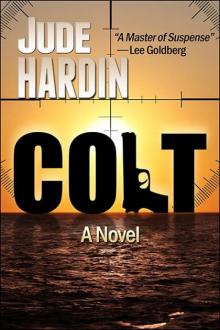 COLT (A Nicholas Colt Thriller)
COLT (A Nicholas Colt Thriller)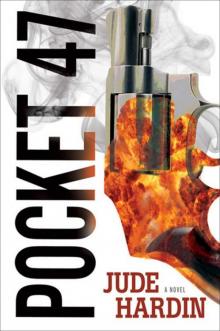 Pocket-47 (A Nicholas Colt Thriller)
Pocket-47 (A Nicholas Colt Thriller) FUSED: iSEAL OMNIBUS EDITION (A Military Technothriller)
FUSED: iSEAL OMNIBUS EDITION (A Military Technothriller) THE JACK REACHER FILES: CHOKE 2 (Episode 2 in the CHOKE Series)
THE JACK REACHER FILES: CHOKE 2 (Episode 2 in the CHOKE Series) Snuff Tag 9 (A Nicholas Colt Thriller Book 3)
Snuff Tag 9 (A Nicholas Colt Thriller Book 3) THE JACK REACHER FILES: HOSTAGE
THE JACK REACHER FILES: HOSTAGE THE JACK REACHER FILES: THE GIRL FROM THE WRONG SIDE OF CORDIAL (with Bonus Thriller THE BLOOD NOTEBOOKS)
THE JACK REACHER FILES: THE GIRL FROM THE WRONG SIDE OF CORDIAL (with Bonus Thriller THE BLOOD NOTEBOOKS) 3 TERRIFYING THRILLERS
3 TERRIFYING THRILLERS The Jack Reacher Files: Fugitive
The Jack Reacher Files: Fugitive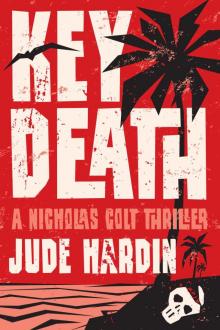 Key Death (A Nicholas Colt Thriller Book 4)
Key Death (A Nicholas Colt Thriller Book 4) SYCAMORE BLUFF (Prequel to THE JACK REACHER FILES: ANNEX 1) (A Nicholas Colt Thriller Book 8)
SYCAMORE BLUFF (Prequel to THE JACK REACHER FILES: ANNEX 1) (A Nicholas Colt Thriller Book 8) VELOCITY
VELOCITY Fire and Ice
Fire and Ice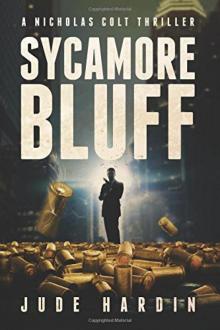 Sycamore Bluff
Sycamore Bluff Jack Reacher Files_Velocity
Jack Reacher Files_Velocity 357 Sunset
357 Sunset THE JACK REACHER FILES: CHOKE (Episode 1 in the CHOKE Series)
THE JACK REACHER FILES: CHOKE (Episode 1 in the CHOKE Series)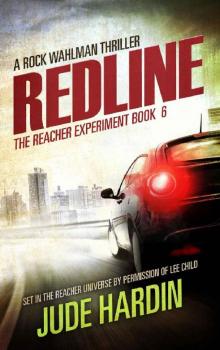 Redline: The Reacher Experiment Book 6 (The Jack Reacher Experiment)
Redline: The Reacher Experiment Book 6 (The Jack Reacher Experiment) Fugitive
Fugitive Fire and ice dm-8
Fire and ice dm-8 American PI
American PI THE JACK REACHER FILES: ANNEX 1 (A Novel of Suspense)
THE JACK REACHER FILES: ANNEX 1 (A Novel of Suspense) THE JACK REACHER FILES: VELOCITY (with bonus thriller CROSSCUT)
THE JACK REACHER FILES: VELOCITY (with bonus thriller CROSSCUT) The Reacher Experiment
The Reacher Experiment Hostage
Hostage Crosscut (A Nicholas Colt Thriller Book 2)
Crosscut (A Nicholas Colt Thriller Book 2) Lady 52: A Jack Daniels/Nicholas Colt Novel
Lady 52: A Jack Daniels/Nicholas Colt Novel